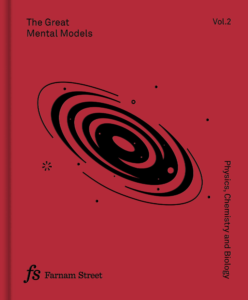
Check out the full notes for “The Great Mental Models, Volume 2: Physics, Chemistry and Biology” by Rhiannon Beaubien and Shane Parrish
I just picked up the Volume 2 of The Knowledge Project’s “The Great Mental Models”. The hardcover is on the way but I just saw that the Kindle version is available so I got it to check it out now. When I was a kid, my parents bought a World Book Encyclopedia set (decades later I learned that door-to-door encyclopedia sales are adjacent to door-to-door knives sales).
I used to think these books were some sort of source of truth for the world.
That core set of books also came with other book sets. All my friends also had encyclopedia sets but they either had more extra sets or just the core sets. Likely based on how convincing the upsell pitch was to their parents.
One of the extra sets was a science one that I would open once in a while but it always seemed too advanced. Then there was another science set with red spines that had the same topics but the books had more illustrations and were more fun to read.
That’s how “The Great Mental Models” feels: easy to read while learning new concepts.
(A level below that was another set called Childcraft which had a “Mathemagic” book with a logic puzzle at the start which probably had some influence on eventually one day learning to program.)
A different mental model book I return to often is “Superthinking” by Gabriel Weinberg and Lauren McCann. I enjoy both. Superthinking is more skimmable, with each model getting 1-2 pages. (“The Great Mental Models” dedicates a full chapter to each mental model so it’s a deeper dive into each with multiple stories.) Superthinking also helped me understand that there isn’t a formal, authoritative list of mental models. They’re the concepts pulled out of disciplines that are most applicable across disciplines.
Creativity often stems from applying a concept from discipline to another.